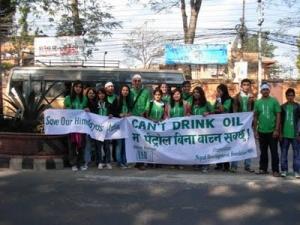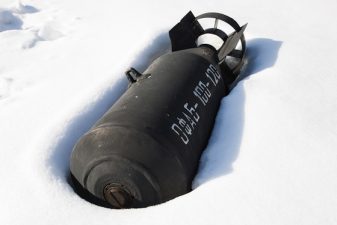 This man singlehandedly produces up to 5,500 bottles of delicious red wine each year, despite living in a frequently drought-stricken region
This man singlehandedly produces up to 5,500 bottles of delicious red wine each year, despite living in a frequently drought-stricken region
Dave Levitan from Onearth, one of our favorite environmental blogs, traveled to Israel to meet with a hardy winemaker in the Negev desert and came away gushing. No, not from all the red wine he drank, though he insists it was good (his emphasis, not ours), but because he was so impressed by how well Daniel Kish manages his vineyard even though the region receives less than four inches of rain a year.
(Earlier this year Maurice called for a boycott of other vineyards that are a deathtrap for wildlife.) Many insights came from this excellent profile, but here’s the most exciting: climate change could destroy everything in its wake, but it might not get our wine!
5,500 bottles of wine with his own sweat and blood
Daniel Kish built everything on the small vineyard and continues to do everything by hand. He produces up to 5,500 bottles every year, which are mostly sold to local clientele and visitors. Although, two restaurants in Tel Aviv pour his brand, says Levitan.
The Derech Eretz winery near Sde Boqer, one of the original Israeli kibbutzes where Israel’s first Prime Minister David Ben-Gurion finally retired, produces boasts six grape varieties, from merlot to syrah, and white wine is on the way. If he can pull it off, Kish will be the first to produce white wine in the country, since these grapes ferment in lower temperatures and therefore requires some kind of cooling technology to thrive.
Drought?
And what about drought, which is becoming increasingly inevitable as climate change makes hot days hotter, and dry days drier? For Kish, who is working with researchers at Ben Gurion university, drought might not be a deal breaker for those of us on the planet who love our wine as much as we love our coffee beans (which are also desperately vulnerable to climate change).
In fact, if managed properly, drought can actually make a vineyard produce better wine, but this is only true if the right combination of factors is reached at precisely the right moment (no pressure.)
Aaron Fait of the Jacob Blaustein Institute for Desert Research at Ben-Gurion explained to Onearth:
Grapes have sort of a complex interaction with drought. [They are] resistant, but if you have drought at certain stages in the life of the grape and the vine, then you will either kill the vine or kill the yield of the vine. But if you manage to regulate the drought … then you really can use the drought response of the vine to produce a better wine.
It’s all about attitude
We worry so much about the impact that climate change will have on the region’s water resources and agriculture, but Levitan claims that Kish seems immune to it all:
The challenge of dealing with a harsh environment, and the even harsher conditions that rising temperatures might soon bring, don’t seem to phase Kish at all.
A religious-looking fellow, Kish’s attitude seems congruent with that of Buddhist monk and master Thich Naht Hanh who recently told The Ecologist that a) we might all be gone in 100 years (in which case, we’re probably going to be less worried about our next bottle of wine) and b) happiness is possible without consuming all the time.
Maybe it is pointless to worry all the time about our future in a climatically changed world. But that doesn’t mean we should give up our good green work!
:: Onearth
Image credit: Derech Eretz Winery, Photobucket
More amazing agricultural projects to write home about:
Rooftop Hydroponic Farms in Egypt Scrub the Air and Uplift Urban Poor
Sustainable Bedouin Farm to Break Ground in the Negev
Liveinslums Brings Food to Life in Cairo’s City of the Dead



